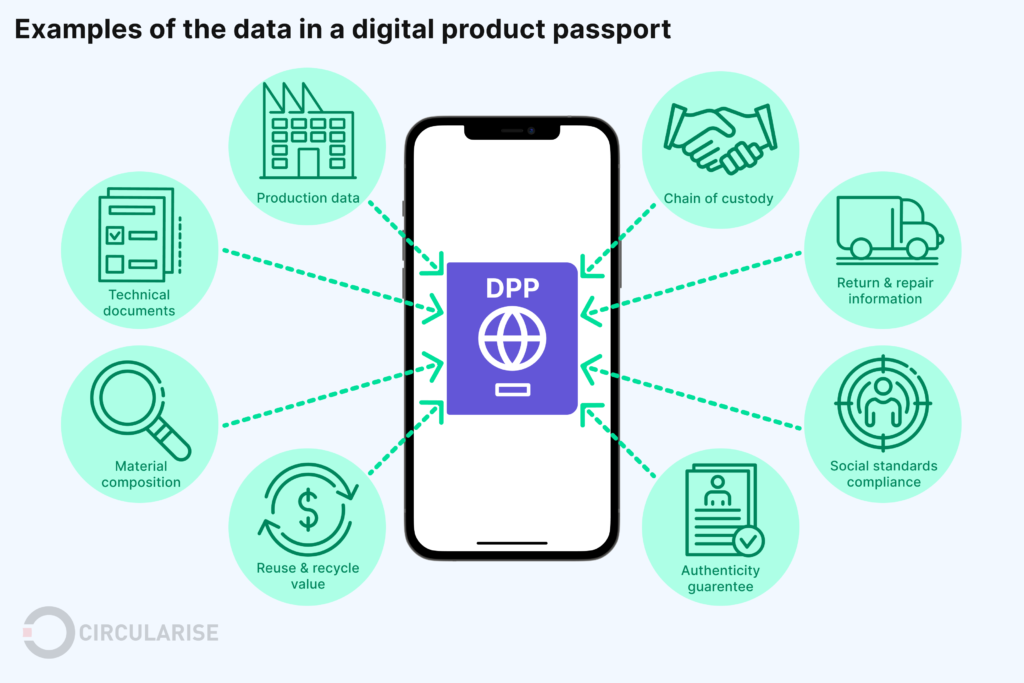Digital product passports (DPPs) are digital records containing detailed information about a product’s lifecycle, including origin, materials, manufacturing process, sustainability attributes, and end-of-life options. The data is stored in a digital file or database accessible through QR codes, RFID tags, or any other scannable technology, on the physical product. This data provides consumers, companies, and regulators with information about a product’s environmental and social impact. The aim is to enhance transparency and traceability in supply chains, support circular economy initiatives, and help consumers make informed purchasing decisions. It also aids in recycling and disposal processes by providing accurate information on handling a product at the end of its life. As sustainability becomes increasingly important, DPPs are emerging as a tool to ensure that products meet environmental, social, and governance (ESG) criteria.

Digital product passports are part of the EU’s Ecodesign for Sustainable Products Regulation (ESPR), which is anticipated to go into effect as early as 2026, and required for all products sold in the EU by 2030. The ESPR aims to significantly improve the circularity, energy performance, and other environmental sustainability aspects of products sold in the EU market.
The European Commission (EC) intends to introduce regulations for DPPs in a phased manner. Initially, the legal obligation to comply will apply to batteries beginning in 2026. This initial stage will be followed by clothing and consumer electronics in further phases. Ultimately, around 30 product categories will require a DPP with the implementation timeline set from 2026 to 2030.
The EC has identified nine categories (more categories may be added in the future) that will be required to create DPPs for their products:
- Batteries
- Textiles, including footwear and garments
- Iron and steel
- Aluminum
- Furniture, including mattresses
- Tires
- Detergents
- Paints
- Lubricants
Impact on North American Companies
North American companies that sell products in the European market, or plan to do so, need to ensure their products comply with DPP regulations or risk being excluded from the market. If any supply chain partners are based in Europe, a company may need to adopt DPP compliance to support their partners’ sustainability efforts. Since the DPP is the first regulation of its kind, it could set a global standard for similar traceability-focused regulations. DPP compliance could eventually become a necessity in multiple markets, requiring US-based companies to maintain complete oversight of all product-related data across the entire supply chain for every item they sell.
Digital Product Passport Data
While the type of DPP data can vary, it usually includes comprehensive details about the product’s lifecycle and supply chain such as:
- Origin: Location where the product was produced or sourced
- Materials: Specific information about the materials used in the product’s creation
- Environmental impact: Details about the product’s carbon footprint and sustainability aspects
- Supply chain information: Insights into the product’s journey from manufacturing to the end consumer
- Disposal guidelines: Recommendations for environmentally responsible disposal of the product
Digital Product Passport Benefits
There are a number of benefits offered by DPPs. They enable better recycling and circular economy practices, help consumers make informed purchasing decisions, assist companies in tracking and improving their supply chains, and support regulatory compliance and sustainability reporting.
They also offer:
- Innovative business models: Adopting circular economy principles and prioritizing product longevity creates opportunities for new business strategies. The product-as-a-service approach is a prime example, where companies offer ongoing services like maintenance alongside the product itself. This model can boost revenue streams.
- Increased consumer confidence: Maintaining comprehensive records of a product’s lifecycle, from production to recycling, provides consumers with transparent and accurate information about its history and current state. This approach will result in a customer remaining loyal to the brand, building a long-term relationship with the company.
- Verified environmental claims: DPPs leverage blockchain technology to authenticate and validate sustainability features and assertions. Such verification addresses the issue of greenwashing where companies falsely market themselves as eco-friendly. This solution is crucial, as over 50% of consumers struggle to determine the authenticity of companies’ environmental claims.
- Safeguarding consumers: Ensuring that raw materials and manufacturing processes adhere to established standards protects customers from counterfeit, hazardous, or inferior products. This also shields companies from potential negative publicity, such as product recalls or managing issues stemming from defects.
Real World Initiatives
Digital product passports are still in the early stages of adoption, but they are gaining traction as a tool to promote sustainability and transparency in global supply chains. There are a number of companies getting an early start on DPP initiatives.
Nobody’s Child has launched three DPP-led collections through the Nobody’s Child x Happy Place by Fearne Cotton collaboration. According to their website, “Each piece created as part of these collections is accompanied by its very own DPP that documents the supply chain touch points. Working with our industry-leading partner Fabacus, we’ve collated a whole world of product information that can be accessed via the QR code on the care label. Together, we’re bridging the gap between where our clothes are made and the people that wear them.”
Everledger and Ford Motor Company have introduced a battery tracking initiative aiming to monitor electric vehicle (EV) batteries throughout their lifespan and promote sustainable recycling practices. This pilot program, known as a “battery passport,” is aligned with the Global Battery Alliance‘s objectives. The system leverages blockchain technology, artificial intelligence, and automatic identification methods to enhance transparency across the battery supply chain.
In conclusion, DPPs are emerging as a key tool in promoting sustainability and transparency in global supply chains. They contain information about a product’s lifecycle, including its origin, materials, manufacturing process, and environmental impact. The EU is taking the lead in implementing DPPs through the ESPR, which is expected to go into effect as early as 2026. Initially, the regulation will apply to batteries, followed by clothing and consumer electronics, with plans to eventually cover approximately 30 product categories.
Implementing DPPs offers numerous benefits including improved recycling practices, informed consumer decision-making, and enhanced supply chain tracking for companies. It also supports regulatory compliance and sustainability reporting. North American companies selling products in the European market will need to ensure compliance with DPP regulations or risk exclusion. Some real-world initiatives are already underway, such as Nobody’s Child’s DPP-led clothing collections and a battery tracking program by Everledger and Ford for EV batteries. As sustainability becomes increasingly important, DPPs are poised to become a standard tool to ensure products meet ESG criteria.


